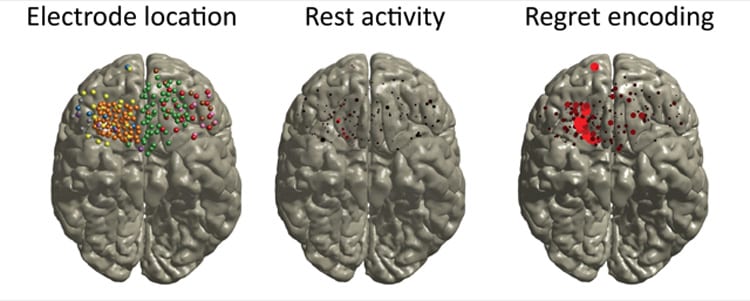What goes through a gambler’s mind after she’s placed her bet?
It’s not just the anticipation of a big payoff, or doubts about the wisdom of her bet. It’s also regret about previous bets, both won and lost, according to UC Berkeley neuroscientists.
“Right after making a choice and right before finding out about the outcome, the brain is replaying and revisiting nearly every feature of what happened during the previous decision,” said senior author Ming Hsu, an associate professor in the Haas School of Business and Helen Wills Neuroscience Institute at UC Berkeley. “Instead of ‘I just gambled but maybe I shouldn’t have,’ it is, ‘Last round I gambled and that was a really good choice.’ Or, ‘I played it safe last time but should have gone for it.’”

The UC Berkeley study is one of a small but growing number of studies that record fast human brain activity – a thousand measurements per second – to reveal the complex array of operations underlying every decision we make, even those that may seem trivial.

The researchers focused on the brain’s orbitofrontal cortex, long-known to be involved in reward processing and social interactions. Indeed, it was one of the main sites of damage in the well-known case involving 19th century railroad worker Phineas Gage, whose left frontal cortex was destroyed after an explosion drove an iron bar through his head. The damage altered his personality, making him impulsive and uninhibited – seemingly a man who didn’t regret any act, no matter how disastrous the outcome.
In recent decades, the orbitofrontal cortex has been shown to be involved in how people value their choice options, how much regret they felt, how much risk they were taking and how valuable their choice was, all of which guide future choices or help someone appraise how good or bad the outcome was.
As shown in this study, however, the orbitofrontal cortex spends much of the time replaying aspects of past decisions. In particular, when people play a gambling game, the main driver of activity in the orbitofrontal cortex is the regret they feel from losing or the regret, after winning, of not having bet more.
“It turns out that the most prevalent information encoded in the orbitofrontal cortex was the regret subjects experienced from their previous decision,” said first author Ignacio Saez, a former UC Berkeley postdoctoral fellow who is now an assistant professor at UC Davis.
With the ability to recognize the pattern of activity associated with regret, the findings could open the door to assessing how well the regret circuits in the brain operate in people with brain injuries or those with behaviors that suggest the absence of regret, including some politicians.